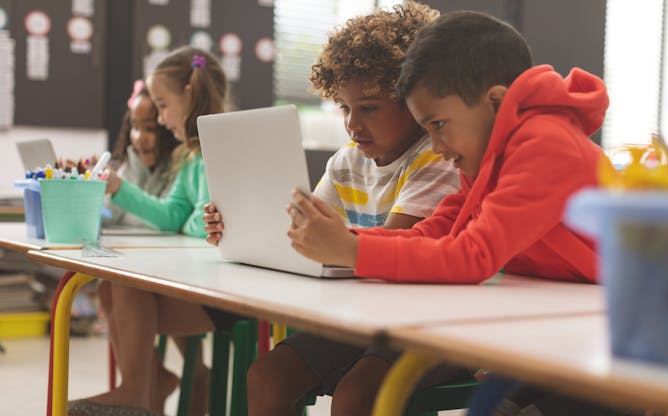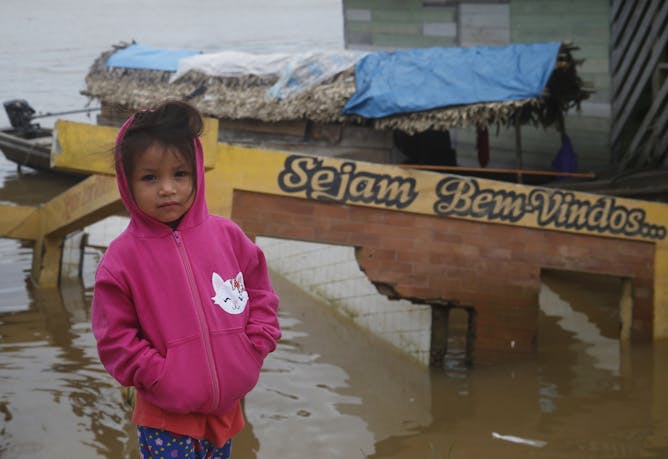|
There’s no doubt that digital tools are increasingly part of children’s and parents’ school experiences. But often it seems the effects of these tools on children’s whole learning and social interactions is an afterthought.
Today in The Conversation Canada, Lucas Johnson of Lakehead University examines the use of freemium software in classrooms: Software that is free for all users to obtain and use, but only with limited features. When users pay, they can unlock further features.
He writes: “In educational settings, software — whether for teaching and learning or parent-teacher communication — should not have tiered offerings where users who have the financial means to pay are privy to a better version of the software with additional features and tools.”
If freemium software is being used, he writes, it should be selected based on evidence and licensed so all students and parents have the same access.
Also today:
Regards,
|

Freemium software in education exacerbates the digital divide for students who may be economically disadvantaged compared to their peers.
(Shutterstock)
Lucas Johnson, Lakehead University
Software that advertises premium features for a fee is ill-suited to school environments, where children should experience universal access.
|

Ferdinand Marcos Jr., the son of the late dictator, gestures as he greets the crowd during a campaign rally in Quezon City, Philippines, in April 2022. He won the May election.
(AP Photo/Aaron Favila)
Bernadette P. Resurrección, Queen's University, Ontario
Ferdinand Marcos Jr.‘s references to a Golden Age in the Philippines invites a nostalgic look at the past. But it also warns of a darker future in keeping with how his father ran the country.
|

Food and agribusiness billionaires reportedly raised their collective wealth by 42 per cent in the last two years.
(Shutterstock)
Phoebe Stephens, University of Toronto
High food prices are exposing yet another risk of our hyper-concentrated global food system and strengthening the case for more diversified and decentralized alternatives.
|

Our curiosity about time travel is thousands of years old.
(Shutterstock)
Peter Watson, Carleton University
Theories exploring the possibility of time travel rely on the existence of types of matter and energy that we do not understand yet.
|

Because of the demanding ways in which they use their voices, performers have increased risks of voice injuries. Canadian singer Michael Bublé underwent vocal cord surgery in 2016.
THE CANADIAN PRESS/Darryl Dyck
Nicole Y.K. Li-Jessen, McGill University; Colin Jones, McGill University
Singers and actors are more likely to have voice injuries, but less likely to report them or seek treatment due to stigma and fears that it may affect their career.
|

Une enfant autochtone du groupe ethnique Mayuruna se tient sur une jetée au bord de la rivière Atalaia do Norte dans l'état d'Amazonas, au Brésil, le 12 juin 2022. La police fédérale et les forces militaires mènent des recherches et des enquêtes sur la disparition du journaliste britannique Dom Phillips et de l'expert en affaires autochtones Bruno Araujo Pereira.
(AP Photo/Edmar Barros)
Félix Bhérer-Magnan, Université Laval
La déforestation de l’Amazonie au Brésil est à son comble. Jusqu’à maintenant, l’année 2022 fracasse tous les records. La déforestation menace dangereusement les droits humains.
|
Ukraine Invasion
|
-
Christopher Morris, University of Portsmouth
Russia’s military planners were not expecting such fierce Ukrainian resistance, especially in regions it has occupied since 2014.
-
Kirill Shakhnov, University of Surrey
Many predicted Russia’s currency would just keep plunging, but it hasn’t.
|
|
Arts
|
-
Valerie M. Fridland, University of Nevada, Reno
A linguist explores the origin of the word ‘father’ – and why derivatives are common in languages across the globe.
|
|
Culture + Society
|
-
Samira Mehta, University of Colorado Boulder
Views on abortion differ not only among major religious traditions, but within each one.
|
|
Environment + Energy
|
-
Ana Rita Patricio, University of Exeter; Martin Beal, ISPA
Protecting green turtles is difficult because they perform some of the longest migrations known in the animal kingdom.
|
|